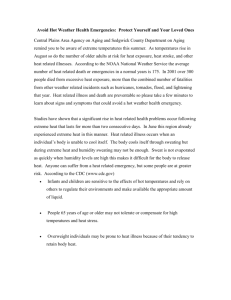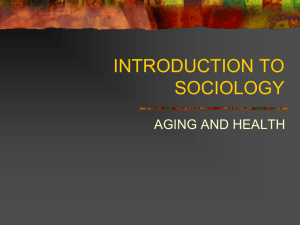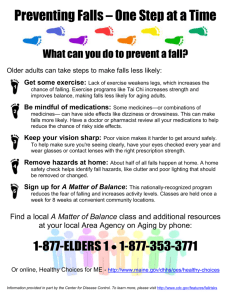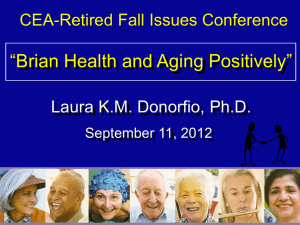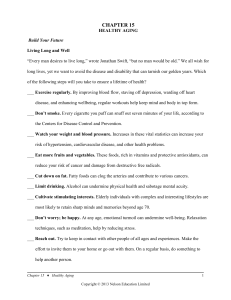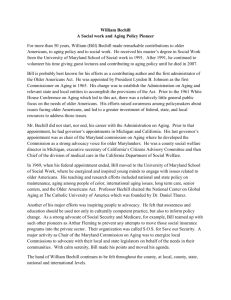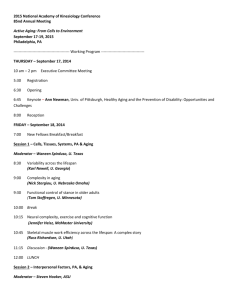State of Aging and Health in America
advertisement
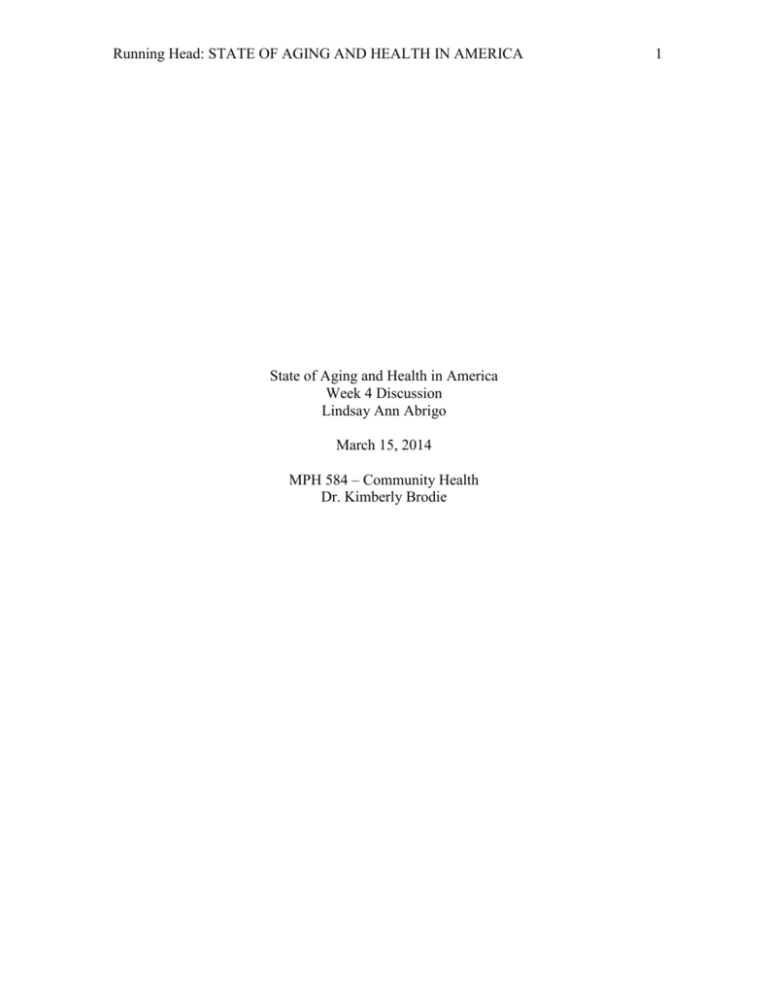
Running Head: STATE OF AGING AND HEALTH IN AMERICA State of Aging and Health in America Week 4 Discussion Lindsay Ann Abrigo March 15, 2014 MPH 584 – Community Health Dr. Kimberly Brodie 1 STATE OF AGING AND HEALTH IN AMERICA 2 Health is defined as a state of complete physical, mental, and social wellbeing (CDC, 2013). With the world’s population aging rapidly, the proportion of elderly adults is expected to “increase from 605 million to 2 billion people over the age of 60” (WHO, 2013). By 2050, it is anticipated that Americans aged 65 or older will number nearly 89 million people, or more than double the number of older adults in the United States in 2010 (CDC, 2013). The most significant issue for elder Americans is receiving the necessary social and emotional support (health promotion/interventions), which can greatly influence an individual’s mental and physical health. Approximately 90% of adults aged 50 or older indicated that they are receiving adequate amounts of support (CDC, 2008). However, adults aged 65 or older were more likely than adults age 50–64 to report that they “rarely” or “never” received the social and emotional support they needed (CDC, 2008). The Centers for Disease Control and Prevention states that social support serves major support functions, including emotional support (sharing problems or venting emotions), informational support (advice and guidance), and instrumental support (providing rides or assisting with housekeeping) (2008; 2013). In addition, receiving adequate social and emotional support is essential to the wellbeing of elder Americans and is “associated with reduced risk of mental illness, physical illness, and mortality” (CDC, 2013). Mental health is essential to overall health and wellbeing (CDC, 2008) and must be recognized and treated with the same urgency as physical health among the elderly population. As such, mental health of elderly Americans has been identified as a priority by the Healthy People 2010 objective, the 2005 White House Conference on Aging, and the 1999 Surgeon General’s report on mental health (CDC, 2008). There are multiple STATE OF AGING AND HEALTH IN AMERICA 3 factors, including biological, psychological, and social factors, which can influence an individual’s mental health. Mental health problems, such as anxiety and depression, have the potential to adversely impact physical health and one’s ability to function, especially in older adulthood (APA, 2014). The American Psychological Association cites an estimate by the Administration on Aging that approximately 20% of adults aged 55 and over suffer from a mental disorder, the most common being anxiety disorders, sever cognitive impairment, and mood disorders (2014). Researchers estimate that the majority of older adults with a mental disorder do not receive the services they need (APA, 2014). Mental health problems both negatively affect and be affected by physical health problems, both of which are often under-identified by healthcare professionals and older people themselves (WHO, 2013). Mental health of older adults can be improved through promoting active and healthy aging. Mental health-specific health promotion for the older adults involves creating living conditions and environments that support wellbeing and allow people to lead healthy and integrated lifestyles (WHO, 2013). Promoting mental health depends largely on strategies that ensure the elderly have the necessary resources to meet their basic needs. These resources include, but are not limited to: Providing security and freedom Adequate housing through supportive housing policy Social support for elderly populations and their caregivers Health and social programs targeted at vulnerable groups such as those who live alone, rural populations or who suffer from a chronic or relapsing mental or physical illness STATE OF AGING AND HEALTH IN AMERICA Violence or older adults maltreatment prevention programs Community development programs (WHO, 2013). 4 In addition, the National Alliance on Mental Illness asserts that the types of services available for older adults with mental health issues vary depending on how sever the need is for each individual (2001). Additional services include individual/group counseling, outpatient counseling, in-home counseling, community mental health centers, mental health education, support groups, etc. It is essential for the aforementioned services to be accessible and available to the elderly population in order to provide each individual with the necessary care and support to promote and maintain mental health. Mental health affects and is affected by physical health. As such, it is my belief that if mental health begins to diminish, an individual is unable to care for oneself to the fullest capacity and to ensure that their overall health and wellbeing is maintained. It is critical to stress that there are effective mental health interventions available for this population. Quality mental health care and adequate support can positively impact the lives of older adults by implementing prevention, early assessment/diagnostic, intervention, and treatment strategies that are appropriate to an elderly individuals’ unique needs. STATE OF AGING AND HEALTH IN AMERICA 5 References American Psychological Association, (2014). Mental and behavioral health and older Americans. Retrieved from website: https://www.apa.org/about/gr/issues/aging/mental-health.aspx Centers for Disease Control and Prevention. National Association of Chronic Disease Directors, (2008). The state of mental health and aging in America issue brief 1: What do the data tell us? Retrieved from website: http://www.cdc.gov/aging/pdf/mental_health.pdf Centers for Disease Control and Prevention. National Center for Chronic Disease Prevention and Health Promotion, Division of Population Health. (2013). Healthy aging data portfolio - indicator summary: Social and emotional support. Retrieved from website: http://nccd.cdc.gov/DPH_Aging/Indicator/IndicatorSummary.aspx?indId=35&Cat Id=7 National Alliance on Mental Illness, (2001). Mental health, mental illness, healthy aging: A NH guide for older adults and caregivers. Retrieved from website: http://www.nami.org/Content/ContentGroups/Home4/Home_Page_Spotlights/Spo tlight_1/Guidebook.pdf World Health Organization, (2013). Mental health and older adults. Retrieved from website: http://www.who.int/mediacentre/factsheets/fs381/en/
